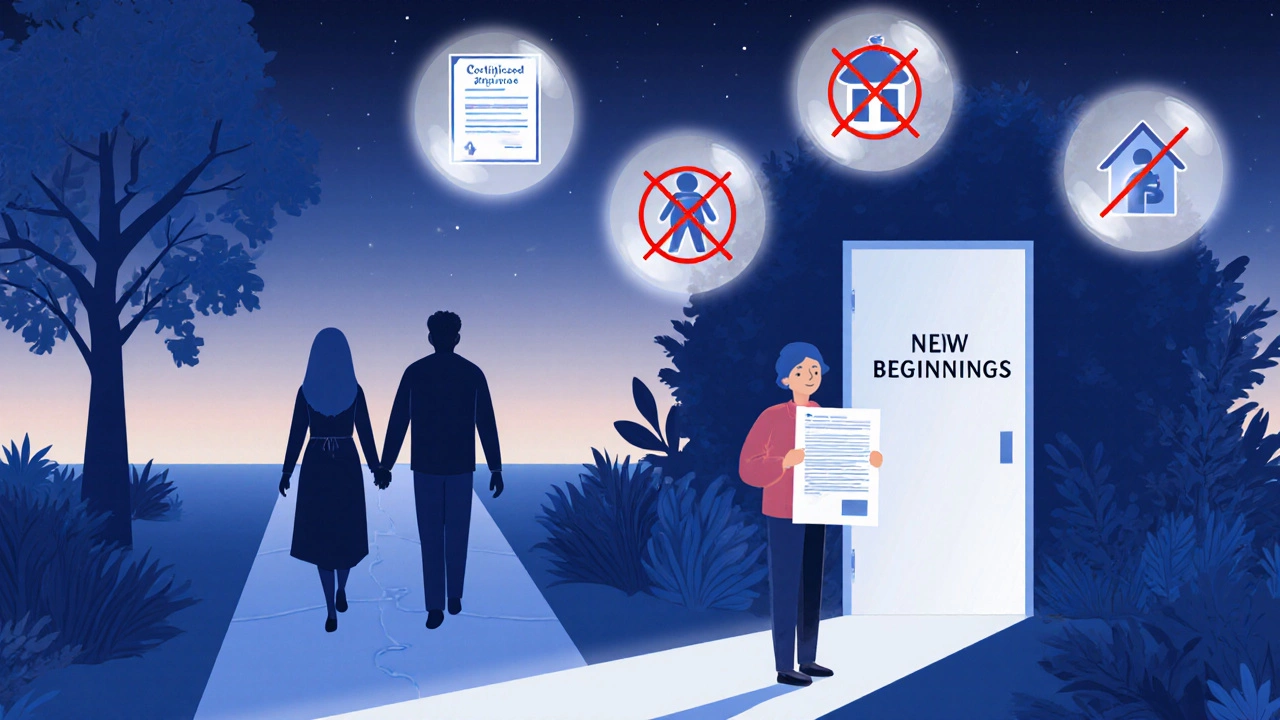Divorce Timeline Calculator
Calculate Your Divorce Timeline
Find out how long your divorce could take based on Indian law requirements
People often ask: What is the fastest divorce in India? The answer isn’t a single date on a calendar-it’s a process shaped by law, cooperation, and paperwork. If both spouses agree and follow the right steps, the quickest divorce in India can wrap up in as little as six months. But if there’s conflict, hidden assets, or contested terms, it can stretch for years. This isn’t about cutting corners. It’s about choosing the right legal path.
How Fast Can You Really Get a Divorce in India?
The shortest possible divorce timeline under Indian law is six months. That’s not a suggestion-it’s a legal requirement under Section 13B of the Hindu Marriage Act, 1955, and similar provisions in the Special Marriage Act and the Dissolution of Muslim Marriages Act. This six-month waiting period applies only to mutual consent divorces. There’s no way around it. Courts won’t grant a divorce before this time, no matter how urgent your situation seems.
Why six months? The law assumes you need time to reconsider. It’s meant to prevent impulsive decisions. But here’s the twist: if both parties are fully aligned and the court is convinced there’s no chance of reconciliation, judges can waive the second motion hearing after six months. That means if you file on January 1 and both appear in court again on July 1, you could walk out with a divorce decree by mid-July.
That’s the fastest scenario. No delays. No disputes. No third-party interference. Just two people who’ve agreed to end things and followed the rules.
What Is a Mutual Consent Divorce?
A mutual consent divorce is the only path to a quick divorce in India. It requires both spouses to agree on three things: that the marriage is over, that they want to divorce, and how to divide assets, custody, and alimony. No accusations. No blame games. Just a signed agreement.
Here’s how it works step by step:
- You and your spouse draft a joint petition stating you’ve been living separately for at least one year.
- You file this petition together in the district court where either of you last lived together.
- After filing, you wait six months. During this time, you can’t change your mind. If one party withdraws, the case is dismissed.
- After six months, you both appear in court again. If you still agree, the judge grants the divorce decree.
Some people think they can skip the six-month wait by filing under fault-based grounds like cruelty or adultery. But that’s a mistake. Those cases are slower. They involve evidence collection, witness testimonies, and multiple court dates. The average fault-based divorce takes 2-5 years. Even if you have proof, it’s not faster-it’s riskier.
Why Mutual Consent Is the Only Real Shortcut
Let’s say you’re tired of waiting. You’ve been separated for two years. Your spouse is agreeable. You’ve split your property, agreed on child support, and even settled who keeps the car. You want this over. The only way to make that happen quickly is mutual consent.
Here’s what happens if you try to go the other way:
- Cruelty claim: You need medical reports, police complaints, or witness statements. Courts are cautious. Many cases get dismissed for lack of proof.
- Adultery: You need hard evidence-texts, photos, hotel records. Even then, courts often ask for reconciliation attempts first.
- Desertion: You must prove your spouse left without cause for at least two years. Proving intent is hard.
These aren’t fast tracks. They’re minefields. Lawyers who promise a divorce in 30 days are either misinformed or misleading you. No lawyer in India can legally bypass the six-month waiting period for mutual consent cases. And no judge will grant a fault-based divorce faster than the law allows.

What Can Go Wrong in a Mutual Consent Divorce?
Even when both sides agree, things can still go sideways. Here are the most common pitfalls:
- Unequal settlement terms: One spouse agrees to give up everything because they’re emotionally drained. Later, they try to reopen the case. Courts won’t allow it-but the damage is done.
- Hidden assets: If one person hides bank accounts, property, or business shares, the divorce can be challenged later. Always get a full financial disclosure before signing.
- Changing your mind: The six-month cooling-off period is binding. If one person backs out, the case ends. You’d have to start over or file under a different ground.
- Missing documents: Marriage certificate, ID proofs, address proofs, income slips-missing even one can delay your filing by weeks.
That’s why having a good divorce lawyer matters. Not because they speed things up, but because they help you avoid traps that look harmless but cost you time and money.
How Much Does a Fast Divorce Cost in India?
Costs vary by city and complexity. In smaller towns, a mutual consent divorce with a local lawyer might cost ₹20,000-₹40,000. In Delhi, Mumbai, or Bangalore, expect ₹60,000-₹1,50,000. That includes drafting the petition, court fees, and two court appearances.
Don’t fall for packages that promise “₹9,999 divorce.” Those are often scams. They skip proper documentation, skip court appearances, or use fake affidavits. If the divorce isn’t legally valid, you’re still married. And that can cause problems with remarriage, inheritance, or visas.
What you’re paying for isn’t speed. It’s certainty. A good lawyer ensures your divorce decree is enforceable in every state, every bank, and every government office.
Can You Get a Divorce Faster Than Six Months?
No. Not legally. Not in any state. Not under any religion. The six-month waiting period is non-negotiable for mutual consent divorces. Even the Supreme Court of India has refused to waive it in exceptional cases like terminal illness or relocation abroad.
Some people think if they move to another country, they can divorce there and bring the decree back to India. That’s risky. Indian courts don’t automatically recognize foreign divorces unless both spouses were residents of that country at the time. If only one person moved, the Indian court may still consider you married.
There’s one exception: annulment. If your marriage was invalid from the start-because of fraud, impotence, or mental incapacity-you can file for annulment. That process can be faster. But it’s not a divorce. It’s a legal declaration that the marriage never existed. You need strong proof. And it’s rare.

What Happens After the Divorce Decree?
Getting the decree isn’t the end. You still need to update your documents:
- Change your marital status on your Aadhaar card and PAN card.
- Update your bank accounts and insurance policies.
- Remove your spouse as nominee in your will or EPF account.
- If you’re changing your name, file a gazette notification.
Many people forget this step. Then they run into problems when applying for loans, jobs, or passports. The divorce decree is your legal proof. Keep at least three certified copies. Store them in a safe place.
When Should You Hire a Divorce Lawyer?
You don’t need a lawyer to file a mutual consent divorce. You can do it yourself. But you should hire one if:
- There’s any disagreement about money or children-even small ones.
- One spouse is pressuring you to sign something you don’t understand.
- You’re unsure what assets are yours versus shared.
- You’ve been separated for less than a year and need help proving separation.
A good divorce lawyer doesn’t fight for you. They protect you. They make sure your agreement is fair, enforceable, and legally bulletproof. They know which court forms are outdated. They know how to avoid delays from clerical errors. And they know how to get your case heard quickly when the court calendar is backed up.
Don’t wait until you’re in court to find one. Talk to a lawyer early-even if you’re just exploring options. Many offer free 30-minute consultations.
Final Reality Check
The fastest divorce in India isn’t about speed. It’s about clarity. If you and your spouse are both ready to walk away-and you’ve agreed on the terms-you can get out in six months. But if you’re still angry, confused, or unsure, rushing won’t help. It’ll just cost you more later.
There’s no magic trick. No loophole. No secret shortcut. Just the law. And if you follow it correctly, you’ll get your freedom without regret.
Can I get a divorce in India in 30 days?
No. Indian law requires a minimum six-month waiting period for mutual consent divorces. There are no legal exceptions. Any lawyer or service promising a 30-day divorce is either mistaken or misleading you.
Is mutual consent divorce faster than contested divorce?
Yes. Mutual consent divorce takes 6-8 months if both parties cooperate. Contested divorces-where one person disagrees-can take 2 to 5 years or longer due to court backlogs, evidence disputes, and repeated hearings.
Can I remarry after a mutual consent divorce in India?
Yes, but only after the divorce decree is granted and the appeal period (90 days) has passed. The decree must be final and not under challenge. Keep your certified divorce certificate ready for marriage registration.
What documents do I need for a mutual consent divorce?
You’ll need: marriage certificate, ID proofs (Aadhaar, passport), address proofs, income statements, and a signed settlement agreement covering property, alimony, and child custody. Both spouses must sign all documents.
Can I file for divorce if I’ve been married for less than a year?
Not under mutual consent. Indian law requires couples to have lived separately for at least one year before filing. However, you may apply for annulment if the marriage was invalid from the start due to fraud, coercion, or mental incapacity.
Do I need a lawyer for a mutual consent divorce?
No, it’s not mandatory. You can file the petition yourself. But without legal help, you risk errors in paperwork, unfair terms, or delays. A lawyer ensures your agreement is clear, enforceable, and legally binding.
What if one spouse refuses to appear in court for the second motion?
If one party doesn’t show up for the second hearing after six months, the court will dismiss the mutual consent petition. You can then file a contested divorce, but that restarts the process and takes much longer.
Can I get a divorce in India if my spouse lives abroad?
Yes, if your spouse agrees to the divorce and signs the joint petition. They can appear via video link or through a power of attorney. The court will accept their consent if properly documented. But if they refuse, you’ll need to file a contested divorce, which is slower and more complex.
